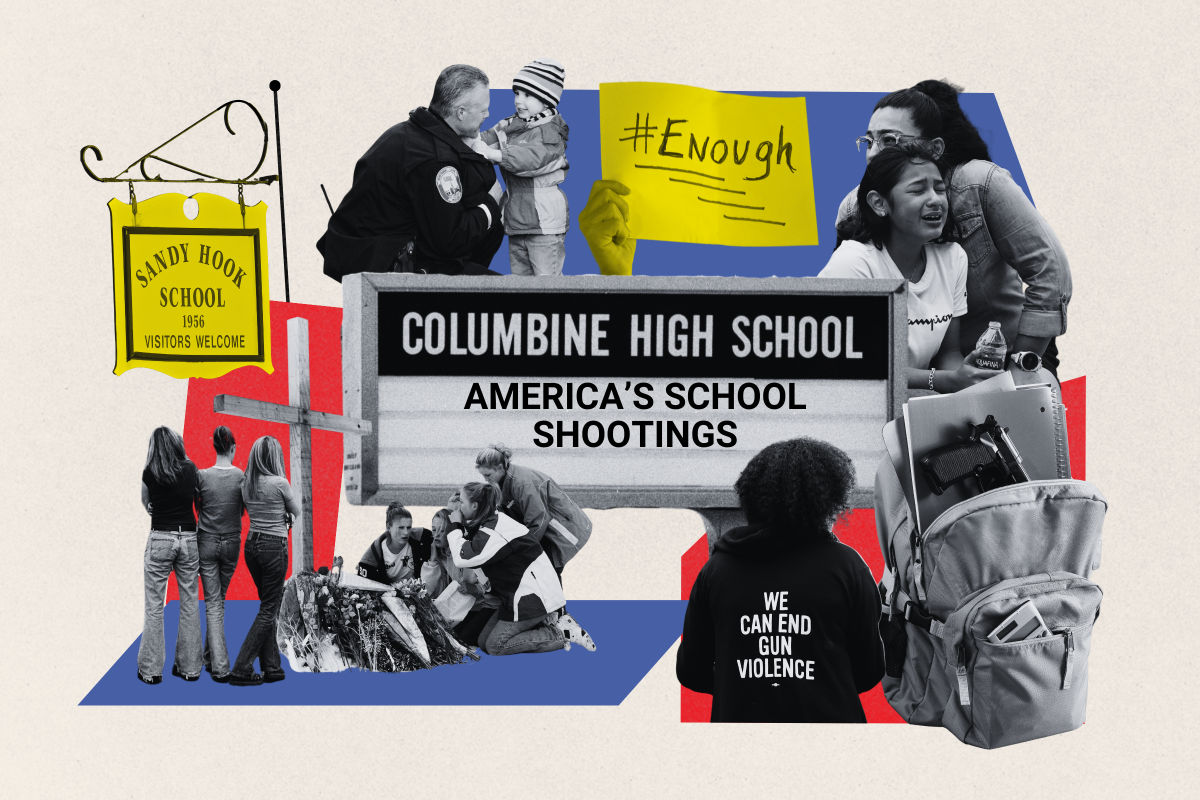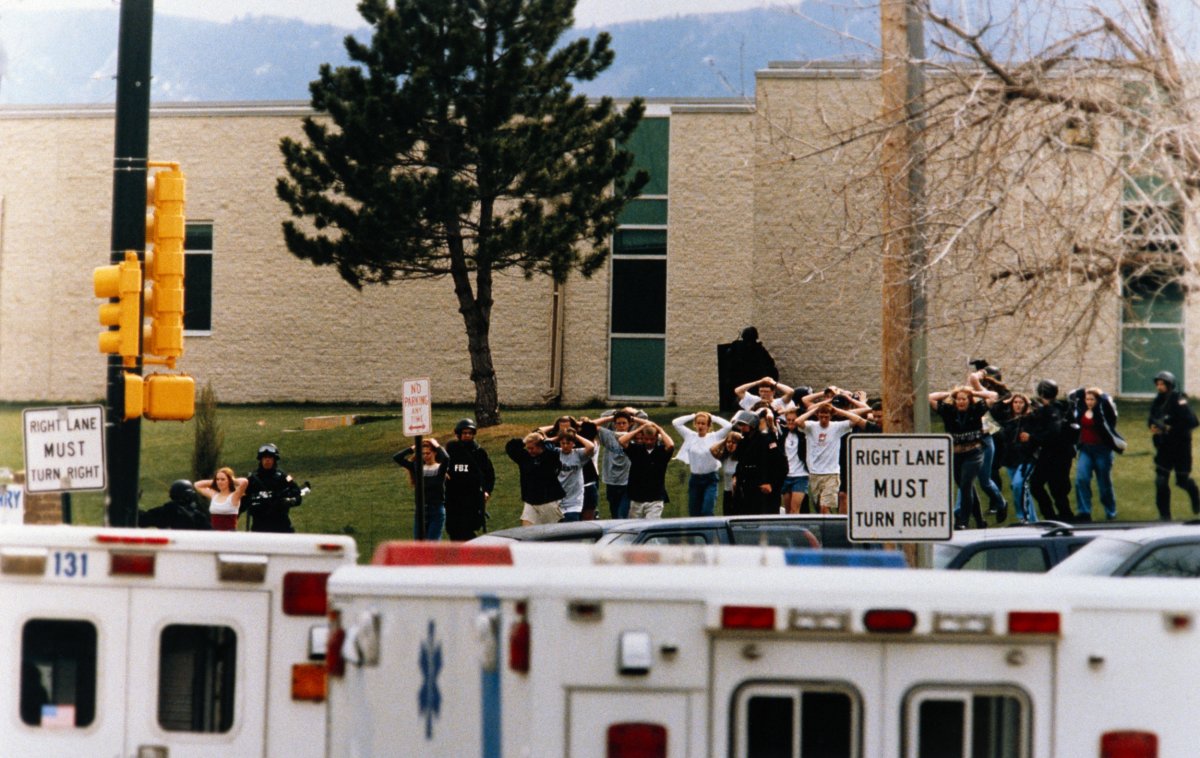It has been a quarter-century since the massacre at Columbine High School.
On April 20, 1999, two teenage gunmen shot and killed 12 students and a teacher in Littleton, Colorado, before turning their guns on themselves.
It ushered in the modern era of school shootings, and polls ever since have captured the fears of many parents that their children are in danger when they go to school.
In those 25 years, the number of people killed with guns on school property has climbed to least 493, David Riedman, the creator of the K-12 School Shooting Database, told Newsweek. At least 138 of those people were killed in active shooter incidents on school grounds.
But determining exactly how many "school shootings" have occurred in the U.S. since Columbine is complicated. It depends on how the term is defined—and can range from just eight to more than 2,000.
The K-12 School Shooting Database uses an inclusive definition that includes any incident when a gun has been brandished, fired or when a bullet has hit school property, regardless of the number of victims, time, day, or reason.
Using that criteria, there have been at least 2,032 school shootings since Columbine—and the number of incidents each year has risen dramatically in recent years. There have been 95 incidents so far in 2024, and last year they climbed to a record high 348.
But the number of school shootings since Columbine goes down to 1,143 if the data is filtered to only account for incidents where one or more victims have been shot.
At least 133 of those incidents involved an "active shooter," defined by Riedman as when the shooter has killed or injured victims, either targeted or random, within the school campus during a continuous episode of violence. Riedman also noted that his research found that the Columbine shooting inspired at least 23 other school shooters.
But if a mass shooting is defined as one where there at least four people have been shot, there have been 59—which excludes some 97 percent of gunfire incidents that have happened on school grounds since Columbine.
School shootings where at least four people have been killed, like the one at Marjory Stoneman Douglas High School in Parkland, Florida, in 2018 and, more recently, at Robb Elementary School in Uvalde, Texas, are even rarer—with only eight such incidents since Columbine.
But "in any of those different ways that you can filter this criteria, there is a trend line that's going up," Riedman told Newsweek.
"Each one of those ways that you filter the data tells an important story for different purposes. If you're a school administrator trying to figure out the whole picture of the problem with gun violence on school property, you care about all 2,000 of those incidents. If you're somebody who only wants to look at mass fatality attacks, where four people were killed, then there would only be eight incidents."

Columbine-Style Shootings Remain Rare
It's important to put the numbers into perspective, so people understand that rampage attacks like Columbine are not common, according to James Alan Fоx, a criminologist at Northeastern University who has been researching gun violence for decades.
"In recent years, there has been a few cases with high numbers of students and staff killed but looking at the long term of incidents in schools, there has not been exponential growth," Fox told Newsweek. "There's been growth in the number of victims but that has to do with [those] few cases" with high death tolls.
The probability of a child being shot while in school is low, Fox said. "It does happen and it's horrific when it does," he said. But "we have 55 million schoolchildren in America and when the average number killed by an armed assailant a year is 7, that has to be put in perspective."
School shootings with mass deaths are "a statistically rare form of crime," said Jaclyn Schildkraut, the executive director of the Regional Gun Violence Research Consortium at the Rockefeller Institute of Government.
"These tragedies have increased in frequency but these are very small increases in numbers because the number of events overall is very low," Schildkraut told Newsweek.
"So even an increase from one shooting to two in a given year would be a 100 percent increase because there are so few mass shootings in schools. Schools are still among the safest places for children when it comes to gun violence, as less than 2 percent of shootings of youth occur at schools."

Parents' Fears
However, polling has found parents' fears for their children's safety at school have been rising in recent years. A Gallup poll last year had 38 percent of parents saying they were afraid for their children, but that number was down from the 44 percent from the year before, in the wake of the Uvalde shooting.
Fox attributes much of the recent fear to the increased news coverage that shootings in schools and those with higher death tolls receive.
He pointed to his research that examined the newsworthiness of mass public shootings. "If they happen at a school, they're more newsworthy, significantly so," he said, adding that death toll is also a major factor in how much news coverage a shooting receives.
Meanwhile, recent polling by Redfield & Wilton Strategies on behalf of Newsweek found that Americans have little confidence that the U.S. could eliminate gun violence.
More than half of respondents—53 percent—said "no" when asked in the April 11 survey if they think the country is capable of decreasing the rate of gun violence to zero, while 29 percent said "yes." Answers to that question have stayed fairly constant since Newsweek started putting it to voters in July last year.
School shootings where the perpetrator is a student are mostly preventable, Riedman said.
"There are almost always warning signs before an attack," he said. "The teenager almost always makes specific threats and talks about violence and what happens is either those threats aren't communicated to adults, adults get the information but don't take it seriously or there's a breakdown in the way that information is shared and it slips through the cracks."
One way the government can work to reduce gun violence in schools, Riedman said, is by investigating "near miss" school shootings. He says there have been 272 such incidents since Columbine, which he defines as a shooting at a school "that had the potential to be much worse."
Schildkraut said: "We know that for events like Columbine, there are numerous warning behaviors and communications that precede the attacks, so one of the most effective ways for these tragedies to be prevented is for individuals with information to come forward and report, and then for others to do something."
Uncommon Knowledge
Newsweek is committed to challenging conventional wisdom and finding connections in the search for common ground.
Newsweek is committed to challenging conventional wisdom and finding connections in the search for common ground.
fairness meter
To Rate This Article
About the writer
Khaleda Rahman is Newsweek's Senior News Reporter based in London, UK. Her focus is reporting on abortion rights, race, education, ... Read more
To read how Newsweek uses AI as a newsroom tool, Click here.








